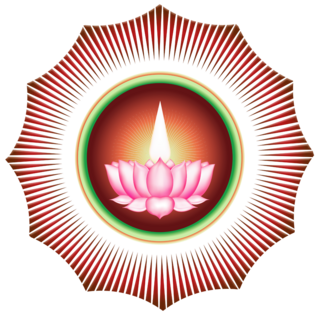
Dharma is a key concept with multiple meanings in Indian religions like Hinduism, Buddhism, Jainism, Sikhism and others. There is no single-word translation for dharma in Western languages.
Smriti, literally "that which is remembered" are a body of Hindu texts usually attributed to an author, traditionally written down but constantly revised, in contrast to Śrutis considered authorless, that were transmitted verbally across the generations and fixed. Smriti is a derivative secondary work and is considered less authoritative than Sruti in Hinduism, except in the Mimamsa school of Hindu philosophy. The authority of smriti accepted by orthodox schools, is derived from that of shruti, on which it is based.

Raja, is a title for a monarch or princely ruler in the Indian subcontinent and Southeast Asia.

Dharma & Greg is an American television sitcom that aired from September 24, 1997, to April 30, 2002.

Artha is one of the four aims of human life in Indian philosophy. The word artha literally translates as "meaning, sense, goal, purpose or essence" depending on the context. Artha is also a broader concept in the scriptures of Hinduism. As a concept, it has multiple meanings, all of which imply "means of life", activities and resources that enable one to be in a state one wants to be in.

Akilathirattu Ammanai, also called Thiru Edu, is the main religious text of the Tamil belief system Ayyavazhi. The title is often abbreviated to Akilam or Akilathirattu.

Thamaraikulam Pathi, is one among the Pancha pathi, the five holy places of Ayyavazhi. The Ari Gopalan Citar, who wrote the Akilam was born here.

Poo Pathi is one among the Pancha pathi, which are the primary worship centers and holy places of Ayyavazhi. As the incarnational activity of Vaikundar, the marriage with Poomadanthai, the Goddess of Earth was the event took place here. This Poomadanthai was the final deity unified by Vaikundar into himself, symbolizing the destruction of Kali from the world (earth).
According to Akilattirattu Ammanai, the scripture of the Ayyavazhi religion, Ayya Vaikundar, the Incarnation of God in Kali Yukam, has five Seedar (disciples). They were in the previous Dwapara Yukam as Pandavas who were transmigrated as disciples of Vaikundar in this Yuga.

Ayyavazhi theology is the theology of a South Indian religious Faith and officially a sect of Hinduism known as Ayyavazhi. Several fundamental theological beliefs distinguish the Ayyavazhi tradition from Hinduism.
Puruṣārtha literally means an "object of human pursuit". It is a key concept in Hinduism, and refers to the four proper goals or aims of a human life. The four puruṣārthas are Dharma, Artha, Kama and Moksha.
In Ayyavazhi mythology, Bhima Citar was one of the five disciples of Ayya Vaikundar. His native place is Karumbattoor, a small village in the district of Kanyakumari. He was Bhima, the most courageous among the Pandavas in the previous Dwapara Yukam, and was transmigrated and given birth in this Kali Yukam as Bhima Citar. In human history he was known as Pantaram.
The Sivakanta Athikarappatthiram is one of the sub-sections of Arul Nool which was the secondary scripture of Ayyavazhi.
The author of the content is unknown. This contains the rules and regulations for the world. It is meant in the way that Ayya giving the acts to Hari Gopalan Citar by sitting in the Pathi facing the north direction while Citar face the south.

The Akilattirattu Ammanai the scripture of Ayyavazhi teaches Dharma on two different perspective. One in sociology as charity and truth and another under spirituality to attain the stage of Oneness, unified into Vaikundar. This state of ultimate oneness is called as Dharma Yukam or Dharma Pathi. Akilam also says that, Dharma is the only living wheel. The sociological way is asked to be followed by every one to attain the spiritual state of Dharma.
This Thangal of Agastheeswaram was the second among the Primary Nizhal Thangals. This Thangal was constructed by Velandi Vathiyar of Agastheeswaram who was a friend of Sakadevan Citar, one among the five disciples of Vaikundar. He earned his name Vathiyar because he conducted platform-school to educate poor children. He along with other devotees, with carol songs, carries Ayya in a cradle to Agastheeswaram from Chettikudiyiruppu.
This Thangal of Kadambankulam was the sixth among the Primary Nizhal Thangals. This Thangal was situated South to Valliyoor, 2 km southeast to Kalantha panai. This was the place where Thavam petral, the daughter of Dharma Citar was married to a man from here. Also, this was the native place of Thuvayal Pandaram, who were the participants of the Thuvayal Thavasu. Ayya also visited this place before his Six-year Tavam. Likewise this place gains so many importance from Ayyavazhi.

The Akilattirattu Ammanai and Arul Nool are the scriptures of Ayyavazhi. While Akilathirattu Ammnai is the primary holy text, Arul Nool is considered the secondary regarding the religious importance. The Akilam is further scheduled into seventeen sections and the Arul Nool into eleven.
Jain texts assign a wide range of meaning to the Sanskrit dharma or Prakrit dhamma. It is often translated as “religion” and as such, Jainism is called Jain Dharma by its adherents.

A Dharma talk (Sanskrit) or Dhamma talk (Pali) or Dharma sermon is a public discourse on Buddhism by a Buddhist teacher.







